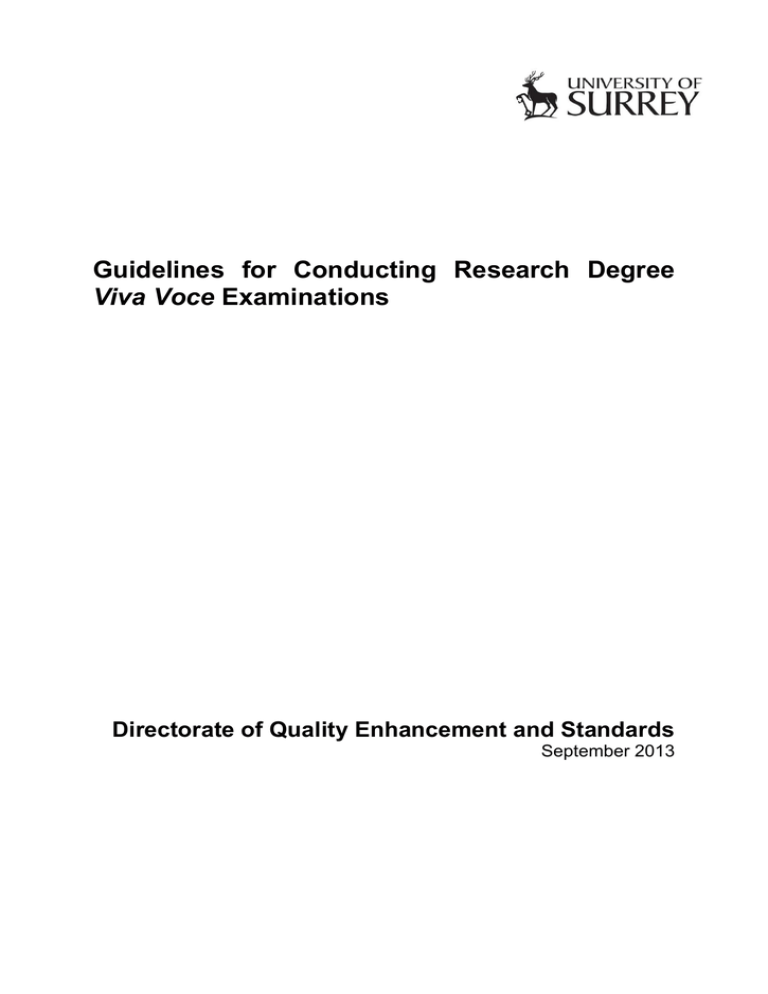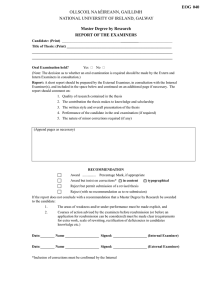Guidelines for Conducting Research Degree Viva Voce Examinations
advertisement

Guidelines for Conducting Research Degree Viva Voce Examinations Directorate of Quality Enhancement and Standards September 2013 Guidelines for Conducting Research Degree Viva Voce Examinations In addition to their role as an examiner, the Internal Examiner will be responsible for ensuring the proper and fair conduct of the viva voce examination, including conformity with General Regulations and the Code of Practice for Research Degrees. They will sign the final joint examination report to confirm that the examination took place according to the regulations, resulting in one of the outcomes permitted by the regulations. Following the oral examination they will be responsible for ensuring that documentation is properly completed ready for submission to the Research Degrees Committee; that, when appropriate, the student is provided with the list of specified, minor corrections or revision additions within 10 working days of the date of the viva and that the examiners’ reports are collated and returned to the Academic Registry. In the event of a resubmission outcome, the examiners will prepare a Statement of Requirements which will be passed to the Academic Registry for sending to the student. From 1st October 2009, an independent Chair will be appointed only in certain cases. The majority of viva voce examinations will be conducted with the Internal Examiner fulfilling the role of the Chair. All new Internal Examiners will have undergone appropriate training in examining and in chairing vivas prior to appointment The following guidelines are intended to clarify the role of conducting a viva voce examination and the associated responsibilities. 1. Regulations and Codes of Practice It is the responsibility of the Internal Examiner or Independent Chair to ensure that, as appropriate, he/she is familiar with: (i) (ii) (iii) (iv) 2. the University’s Code of Practice for Research Degrees; Section C of the General Regulations; University policy and regulations regarding academic misconduct (including plagiarism); any specific programme regulations, particularly in the case of Practitioner Doctorates; Role of the Chair/Internal Examiner The primary role of the Independent Chair/Internal Examiner is to ensure that: (i) (ii) (iii) the viva voce examination process is rigorous, fair, reliable and consistent; the candidate has the opportunity to defend the thesis and respond to all questions posed by the examiners; questioning by the examiners is conducted fairly and professionally (iv) (v) (vi) the examiners adhere to the University’s regulations and procedures, giving advice regarding the regulations to both the examiners and the candidate if required; the examiners’ preliminary reports have been completed and received prior to the viva; that the recommendations of the examiners are communicated clearly to the candidate and in a timely fashion. An independent Chair (if appointed) is not expected to question the student about the work being examined; to this end, it is not expected that an independent Chair should receive or read a copy of the thesis or portfolio in preparation for the examination. In the case of disagreement between the examiners, the role of the Independent Chair (if one has been appointed) is confined to advising the examiners on the regulatory options; the Chair does not have an additional casting vote but should use his/her best endeavours to help the examiners to reach an agreed position. 3. The Viva Voce Examination At the start of the examination, the Internal Examiner/Chair should introduce all parties present, and ensure that the candidate has seen a copy of the Code of Practice for Research Degrees and the appropriate set of General Regulations and read all of the relevant sections. During the examination and the discussion held afterwards, the Internal Examiner/Chair should be prepared to interrupt the examination in the following circumstances: to provide advice on regulations, procedures, policy and practice; where there is any activity that is not ‘rigorous, fair, reliable or consistent’; where there is any activity which contravenes the University’s Equal Opportunities Policy. Should it become necessary to interrupt the normal course of the examination for any of the above reasons, the Internal Examiner/Chair may feel it appropriate to call a temporary intermission in the examination in order to speak with the (other) examiner(s) in private. When the examiners have finished their discussions with the candidate, the Internal Examiner/Chair should ensure that everyone, including the candidate, has had an opportunity to ask any questions. In cases where the supervisor(s) is/are in attendance at the viva, the candidate may wish to speak with the examiners in the absence of the supervisor(s) and the Internal Examiner/Chair should be prepared to facilitate this. The Internal Examiner/Chair should draw the proceedings to a close and explain the next steps. Ordinarily, the Internal Examiner/Chair will ask the candidate to withdraw from the room and to return at an agreed time, while the examiners consider the outcome(s) of the examination and their recommendation to the RDC. 4. Examination Outcomes The examiners will make one of the following recommendations (See regulations for the Degrees of Master of Philosophy (MPhil), Doctor of Philosophy (PhD) and Doctor of Medicine (MD) by Research and Thesis or the General Regulations for Practitioner Doctorate Degrees): (i) that the Degree be awarded; (ii) that the degree be awarded, subject to specified minor corrections 1 being made to the thesis or portfolio to the satisfaction of the Internal Examiner within a period not exceeding one month (iii) that the Degree be awarded, subject to specified, minor revisions2 being made to the thesis or portfolio to the satisfaction of the Internal Examiner within a period not exceeding six months; (iv) that the Degree not be awarded, but that the student be permitted to submit a revised thesis, by a specified date, normally twelve months, with or without further research, and be examined with or without a further viva voce examination; (v) that for those students registered for the PhD or MD, that Degree not be awarded but that the Degree of Master of Philosophy be awarded, if appropriate, after specified minor corrections or minor revisions have been made to the thesis or portfolio, and if the student submits the thesis for that Degree within one month in the case of minor corrections or six months in the case of minor revisions or as otherwise agreed by the Research Degrees Committee; (vi) that for those students registered for the PhD or MD, that Degree not be awarded but the student be permitted to submit a revised thesis, for the degree of Master of Philosophy, by a specified date, (normally twelve months), with or without further research, and be examined with or without a further viva voce examination; (vii) that the Degree not be awarded and with no recommendation regarding a resubmission of the thesis (normally only applicable following a re-submission). 1 The phrase “specified, minor corrections” shall be taken to include the correction of minor corrections, minor errors of fact, typography, grammar, style, syntax and/or layout of graphs/tables etc., which would enhance the readers’ understanding of the author’s argument but which does not alter the intellectual content and reasoning of the thesis. 2 “Minor revisions” are those which do not involve further supervision or any further original research. Such additions might include, for example, additional sentences, tables, paragraphs or pages but not normally additional chapters. They may additionally include specified minor corrections. The examiners may not recommend re-submission for a second time, but may make one of the recommendations (i), (ii), (iii) (v) or (vii) above. In the event that the examiners cannot agree on a single recommendation, the Internal Examiner/Chair should explain that the examiners are able to submit separate reports. In this event, the Research Degrees Committee shall appoint an additional external examiner to review the thesis and the original examiners’ reports which will be anonymised. The additional examiner may require the student to undergo another viva voce examination. The Research Degrees Committee shall consider the reports of all examiners before reaching a decision. It is the responsibility of the Internal Examiner/Chair to explain this (very infrequent) procedure to the candidate. 5. Academic Misconduct The procedures for handling academic misconduct by students are detailed in Section E of the Regulations – Academic Integrity. If the examiners of a doctoral thesis or portfolio suspect possible academic misconduct prior to or during the viva voce examination, the relevant Academic Integrity Officer should be consulted and the University procedures followed. 6. To Conclude the Examination The Internal Examiner/Chair should ensure that the candidate is informed expeditiously of the outcome of the examination. The Internal Examiner/Chair must sign and date the examination entry form, ensuring that the other examiner(s) also sign to indicate that it is a joint recommendation. If specified minor corrections or revisions are required to the thesis or portfolio, the Internal Examiner shall inform the student of the nature of the corrections, within 10 working days of the viva voce, in the form of a written list. Any corrections required to the thesis shall be completed and the thesis permanently bound within one month of receipt of the corrections. Minor revisions shall be completed, and the thesis permanently bound, within six months of receipt of the revisions, unless the Research Degrees Committee allows a longer time. The Internal Examiner shall, within 20 working days of submission of the corrected thesis, certify that any specified, minor corrections or minor revisions have been carried out satisfactorily. Where there is no internal examiner on the panel, the Chair will ask the panel to agree who will assume responsibility for certifying completion of the specified, minor corrections or revisions. In the case of a resubmission, a student shall be informed in writing within 10 working days after the viva of the reasons for the examiners' rejection of the original thesis, normally by being sent by the Academic Registry a Statement of Requirements prepared by the examiners listing the principal aspects of the thesis which require improvement, a copy of which will be appended to the Examination Entry Form. A student may submit a revised thesis once only. The Examiners shall determine the date by which the revised thesis shall be submitted, normally twelve months after the original viva voce The Internal Examiner is responsible for ensuring that the following forms are sent to the relevant Faculty PGR Administrator as soon as possible: a) b) c) d) e) f) the completed and signed entry form (original) the examiners’ pre-viva reports on the thesis/portfolio (originals) any additional reports from supervisors any additional reports on the conduct of the viva voce examination copy of the of the list of minor corrections or additions (if applicable) copy of the statement of requirements for a re-submission (if applicable) Faculty administrators should retain copies of all the relevant forms and send the originals of (a) and (b) above and copies of other forms to the Academic Registry; the award recommendation cannot be processed without this paperwork. Should the examination raise concerns either in respect to the conduct of the viva itself, or in respect to the management of or provision of resources for the research project the Internal Examiner/Chair should supplement the report forms with a written report to the Academic Quality Officer (Postgraduate). 7. Data Protection In accordance with Data Protection legislation, examiners’ reports may be made available upon request to the candidate after the viva voce examination has taken place. Revised July 2013

